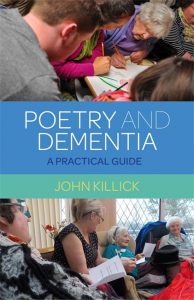Poetry and Dementia: A Practical Guide
John Killick
Jessica Kingsley Publishers 2017 ISBN: 9781785921766 £16.99
I wonder what your relationship to poetry is? I have met some people that simply do not get this way of expression; others who simply haven’t got the time or the inclination to attend very closely to the shape and form and sound words.
Others live by its art form as a profound expression of truth through the limitations of human language. They delight in the way in which poets use language and see its power to enlarge, transform and change. Certainly, poetry has the ability to convey emotion and offer picture, which other forms of language seem sometimes to appear inadequate or limited.
Poetry has a musical quality to it. It is multi-layered. It has the capacity to generate meaning and feeling. It can be radical. It can be beautiful. It can completely transform our relationship to an experience, an image, a person or some experience. It is always work in progress – while there might be some good interpretations of the word set out on a page, they can never be a definite interpretation!
John Killick is a pioneer and his work has had a profound effect on a whole variety of people, situations and institutions. He is brave and adventurous. He is bold and imaginative. He has strong convictions but is open to ambiguity and paradox. His work is gathered together in this short but well-written book.
Chapter 1 offers an introduction to poetry. Chapter 2 explores the reading of poetry and Chapter 3 the writing of poetry. John goes into deeper reflection about what emerges from the reading and writing of poetry in Chapter 4 then offers us some conclusions in chapter 5. There are resources in relation to books, organisations and websites at the end of the book.
There is an accessibility and a surprising intimacy and immediacy to this book, which reflects John Killicks style. He clearly explains how to use the poetry in a way that offers – at least on paper – an exciting possibility of enabling people with dementia to have a voice. Fundamental to this is the capacity to listen carefully and to be adventurous in stimulating exchange in conversation.
The poems by people living with dementia were especially and significantly both moving and beautiful in different ways.
It would be naïve to imagine that in terms of organisation and delivery there will be a significant take-up of this kind of individual and group activity amongst people living with dementia. Resources are limited and so is our imagination and so this shapes a limited and less holistic approach to an individual and their relationship to memory.
It would be wonderful to put into the hands of all those who are responsible for organising dementia care a copy of this book and to ask them to write poetry with the people they serve and support.
This is quite simply a brilliant book from the hand of an extraordinary, inventive and creative hand and mind and heart.
James Woodward
Sarum College
